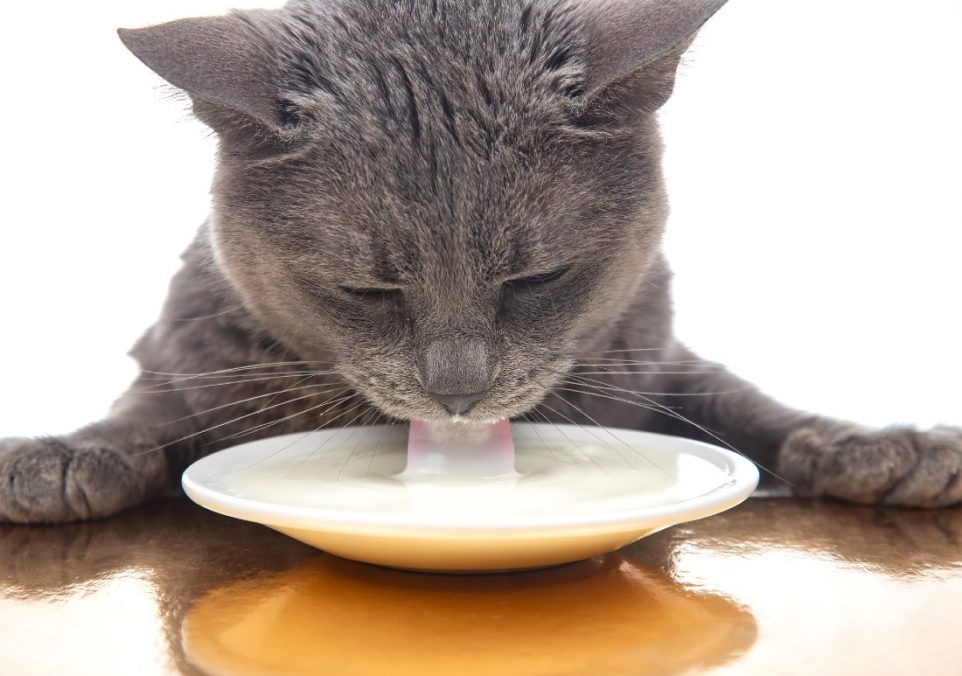Can Cats Drink Almond Milk? Here’s What Experts Say

Cats are well known for their selective and sometimes finicky dietary preferences. While they primarily rely on a diet of meat and water, many cat owners wonder if they can treat their feline friends to something different, like almond milk.
Almond milk has become a popular dairy milk alternative for humans due to its lactose-free and plant-based nature. It’s safe for human consumption but is it safe and suitable for cats? In this guide, we’ll explore whether cats can drink almond milk, the potential risks and benefits, and what experts have to say about this intriguing dietary option for our four-legged companions.
Can Cats Drink Almond Milk?
The short answer is no—it is not advisable to feed almond milk to cats as a regular part of their diet, though a vet visit is the best way to receive a broader response and more personalized guidance. In general, giving a cat almond milk may lead to digestive issues, nutritional deficiencies, allergic reactions, or weight gain.
Lactose Intolerance
Many adult cats are lactose intolerant, meaning they lack sufficient levels of lactase, the enzyme needed to digest lactose, the sugar found in milk. Feeding a lactose-intolerant cat any type of milk, including almond milk, can lead to digestive upset, including diarrhea, gas, and stomach cramps.
Nutritional Deficiencies
Cats are obligate carnivores, which means their diet must primarily consist of animal-derived protein. While almond milk is generally enriched with vitamins and minerals to make it nutritionally similar to cow’s milk for humans, it doesn’t provide the essential nutrients that cats need to thrive.
Potential Allergies
Just as with humans, some cats may have allergies to nuts, including almonds. Introducing almond milk into their diet could trigger allergic reactions, such as itching, rashes, or digestive issues.
High-Fat Content
Almond milk can be higher in fat and sugar than regular cow’s milk. It can contribute to weight gain or obesity in cats if consumed regularly in large quantities.
What Should Cats Drink?
Cats primarily need water to stay properly hydrated and healthy. Providing clean, fresh water for your cat at all times is essential. If you’re concerned about your cat’s water intake, consider a cat fountain, which can encourage them to drink more.
Alternatives to Almond Milk
If you’re looking to pamper your feline friend with a special treat or hydration alternative, there are cat-friendly options to consider. Cat milk, available in some pet stores, is lactose-free and specifically designed for feline consumption, making it a safe occasional indulgence.
Alternatively, plain and low-sodium chicken or beef broth can provide a flavorful and hydrating option for cats, as long as it’s free from seasonings or additives that could be harmful. Some cats may also enjoy catnip tea, which you can brew and cool to room temperature before offering it as a unique treat. There is also a selection of “cat wines” on the market that are usually made with cat nip, fish, and other flavors made for cats as a treat.
However, for personalized guidance regarding your cat’s dietary needs, it’s always advisable to consult with your veterinarian, as they can offer insights into suitable treats or supplements to enhance your cat’s nutrition and well-being.
Conclusion
While almond milk is a popular choice for lactose-intolerant humans, it’s not a suitable beverage for cats. Cats have different nutritional needs, and their digestive systems are not equipped to process almond milk or other dairy alternatives.
To ensure your cat’s well-being, prioritize a balanced diet consisting of high-quality cat food and fresh, clean water. If you’re considering introducing new treats or beverages into your cat’s diet, consult your veterinarian for guidance on safe and suitable options.
Your Pet’s Best Interest, Always
At Pet Institute, we take pet care seriously. We're dedicated to transparency, impartiality, and the well-being of your pets in every article, review, and recommendation we provide. Our unwavering commitment to these principles ensures that you, our valued reader, always receive reliable and unbiased information. Let us be your trusted guide in the world of pet care and companionship.